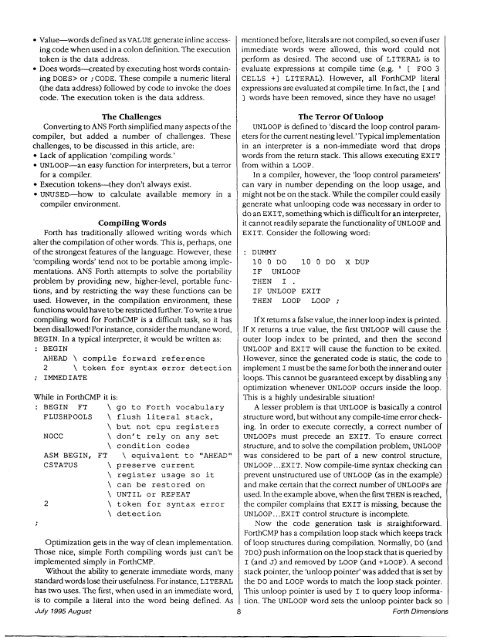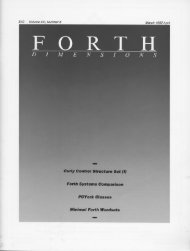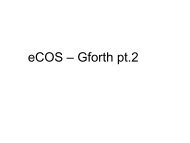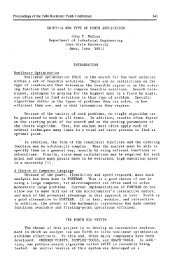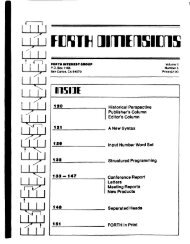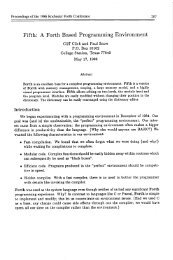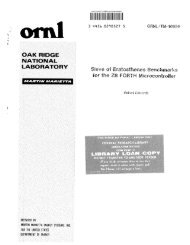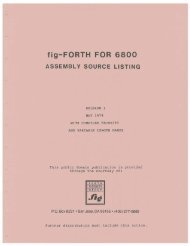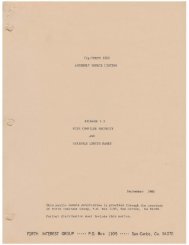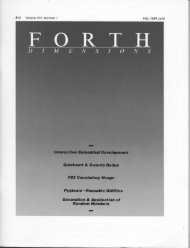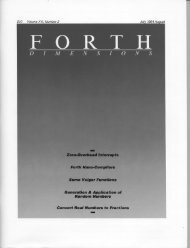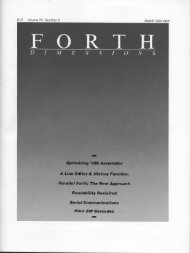2 - Forth Interest Group
2 - Forth Interest Group
2 - Forth Interest Group
You also want an ePaper? Increase the reach of your titles
YUMPU automatically turns print PDFs into web optimized ePapers that Google loves.
Value-words defined as VALUE generate iniine access-<br />
ing code when used in a colon definition. The execution<br />
token is the data address.<br />
Does words--created by executing host words contain-<br />
ing DOES> or ; CODE. These compile a numeric literal<br />
(the data address) followed by code to invoke the does<br />
code. The execution token is the data address.<br />
The Challenges<br />
Converting to ANS <strong>Forth</strong> simplified many aspects of the<br />
compiler, but added a number of challenges. These<br />
challenges, to be discussed in this article, are:<br />
Lack of application 'compiling words.'<br />
UNLOOP-an easy function for interpreters, but a terror<br />
for a compiler.<br />
Execution tokens-they don't always exist.<br />
UNUSED-how to calculate available memory in a<br />
compiler environment.<br />
Compiling Words<br />
<strong>Forth</strong> has traditionally allowed writing words which<br />
alter the compilation of other words. This is, perhaps, one<br />
of the strongest features of the language. However, these<br />
'compiling words' tend not to be portable among imple-<br />
mentations. ANS <strong>Forth</strong> attempts to solve the portability<br />
problem by providing new, higher-level, portable func-<br />
tions, and by restricting the way these functions can be<br />
used. However, in the compilation environment, these<br />
functions would have to be restricted further. To write a true<br />
compiling word for <strong>Forth</strong>CMP is a difficult task, so it has<br />
been disallowed! For instance, consider the mundane word,<br />
BEGIN. In a typical interpreter, it would be written as:<br />
: BEGIN<br />
AHEAD \ compile forward reference<br />
2 \ token for syntax error detection<br />
; IMMEDIATE<br />
While in <strong>Forth</strong>CMP it is:<br />
: BEGIN FT \ go to <strong>Forth</strong> vocabulary<br />
FLUSHPOOLS \ flush literal stack,<br />
\ but not cpu registers<br />
NOCC \ don't rely on any set<br />
\ condition codes<br />
ASM BEGIN, FT \ equivalent to "AHEAD"<br />
CSTATUS \ preserve current<br />
\ register usage so it<br />
\ can be restored on<br />
\ UNTIL or REPEAT<br />
2 \ token for syntax error<br />
\ detection<br />
,<br />
Optimization gets in the way of clean implementation.<br />
Those nice, simple <strong>Forth</strong> compiling words just can't be<br />
implemented simply in <strong>Forth</strong>CMP.<br />
Without the ability to generate immediate words, many<br />
standard words lose their usefulness. For instance, LITERAL<br />
has two uses. The first, when used in an immediate word,<br />
is to compile a literal into the word being defined. As<br />
July 1995 August<br />
mentioned before, literals are not compiled, so even ifuser<br />
immediate words were allowed, this word could not<br />
perform as desired. The second use of LITERAL is to<br />
evaluate expressions at compile time (e.g. ' [ FOO 3<br />
CELLS t] LITERAL). However, all <strong>Forth</strong>CMP literal<br />
expressions are evaluated at compile time. In fact, the I and<br />
] words have been removed, since they have no usage!<br />
The Terror Of Unloop<br />
UNLOOP is defined to 'discard the loop control param-<br />
eters for the current nesting level.' Typical implementation<br />
in an interpreter is a non-immediate word that drops<br />
words from the return stack. This allows executing EXIT<br />
from within a LOOP.<br />
In a compiler, however, the 'loop control parameters'<br />
can vary in number depending on the loop usage, and<br />
might not be on the stack. While the compiler could easily<br />
generate what unlooping code was necessary in order to<br />
do an EXIT, something which is difficult for an interpreter,<br />
it cannot readily separate the functionality of UNLOOP and<br />
EXIT. Consider the following word:<br />
: DUMMY<br />
10 0 DO 10 0 Do x DUp<br />
IF UNLOOP<br />
THEN I .<br />
IF UNLOOP EXIT<br />
THEN LOOP LOOP ;<br />
If x returns a false value, the inner loop index is printed.<br />
If x returns a true value, the first UNLOOP will cause the<br />
outer loop index to be printed, and then the second<br />
UNLOOP and EXIT will cause the function to be exited.<br />
However, since the generated code is static, the code to<br />
implement I must be the same for both the inner and outer<br />
loops. This cannot be guaranteed except by disabling any<br />
optimization whenever UNLOOP occurs inside the loop.<br />
This is a highly undesirable situation!<br />
A lesser problem is that UNLOOP is basically a control<br />
structure word, but without any compile-time error check-<br />
ing. In order to execute correctly, a correct number of<br />
UNLOOPs must precede an EXIT. To ensure correct<br />
structure, and to solve the compilation problem, UNLOOP<br />
was considered to be part of a new control structure,<br />
UNLOOP . . .EX1 T. Now compile-time syntax checking can<br />
prevent unstructured use of UNLOOP (as in the example)<br />
and make certain that the correct number of UNLOOPs are<br />
used. In the example above, when the first THEN is reached,<br />
the compiler complains that EXIT is missing, because the<br />
UNLOOP.. .EXIT control structure is incomplete.<br />
Now the code generation task is straightforward.<br />
<strong>Forth</strong>CMP has a compilation loop stack which keeps track<br />
of loop structures during compilation. Normally, DO (and<br />
?DO) push information on the loop stack that is queried by<br />
I (and J) and removed by LOOP (and +LOOP). A second<br />
stack pointer, the 'unloop pointer' was added that is set by<br />
the DO and LOOP words to match the loop stack pointer.<br />
This unloop pointer is used by 1 to query loop informa-<br />
tion. The UNLOOP word sets the unloop pointer back so<br />
8 <strong>Forth</strong> Dimensions


